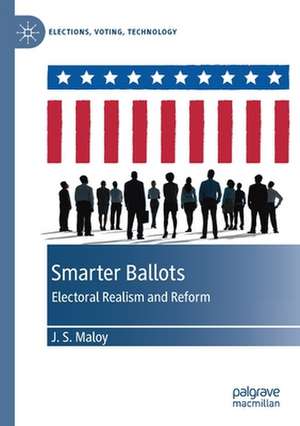Smarter Ballots: Electoral Realism and Reform: Elections, Voting, Technology
Autor J.S. Maloyen Limba Engleză Paperback – 14 aug 2020
| Toate formatele și edițiile | Preț | Express |
|---|---|---|
| Paperback (1) | 581.01 lei 6-8 săpt. | |
| Springer International Publishing – 14 aug 2020 | 581.01 lei 6-8 săpt. | |
| Hardback (1) | 585.26 lei 6-8 săpt. | |
| Springer International Publishing – 19 iun 2019 | 585.26 lei 6-8 săpt. |
Preț: 581.01 lei
Preț vechi: 683.54 lei
-15% Nou
Puncte Express: 872
Preț estimativ în valută:
111.20€ • 114.60$ • 93.88£
111.20€ • 114.60$ • 93.88£
Carte tipărită la comandă
Livrare economică 03-17 martie
Preluare comenzi: 021 569.72.76
Specificații
ISBN-13: 9783030130336
ISBN-10: 3030130339
Pagini: 229
Ilustrații: XX, 229 p. 48 illus.
Dimensiuni: 148 x 210 mm
Greutate: 0.34 kg
Ediția:1st ed. 2019
Editura: Springer International Publishing
Colecția Palgrave Macmillan
Seria Elections, Voting, Technology
Locul publicării:Cham, Switzerland
ISBN-10: 3030130339
Pagini: 229
Ilustrații: XX, 229 p. 48 illus.
Dimensiuni: 148 x 210 mm
Greutate: 0.34 kg
Ediția:1st ed. 2019
Editura: Springer International Publishing
Colecția Palgrave Macmillan
Seria Elections, Voting, Technology
Locul publicării:Cham, Switzerland
Cuprins
1. Introduction: Electoral Dysfunction and Political Realism.- 2. What Research Reveals: Deficits of Electoral Accountability.- 3. What Research Overlooks: Voters’ Dilemma of Disempowerment.- 4. Lessons from Theory: The Blunted Blade of One-Mark Ballots.- 5. Lessons from Experience: The Cutting Edge of Ranking and Grading Ballots.- 6. America Re-Votes, 2016: Retrospective Simulations with Smarter Ballots.- 7. Conclusion: A Realist’s Agenda for Research and Reform.
Notă biografică
J.S. Maloy is Professor and Kaliste Saloom Endowed Chair of Political Science at the University of Louisiana, Lafayette, USA.
Textul de pe ultima copertă
This book presents a new democratic theory of election reform, using the tradition of political realism to interrogate and synthesize findings from global elections research and voting theory. In a world of democratic deficits and uncivil societies, political researchers and reformers should prioritize creating smarter ballots before smarter voters. Many democracies’ electoral systems impose a dilemma of disempowerment which traps voters between the twin dangers of vote-splitting and “lesser evil” choices, restricting individual expression while degrading systemic accountability. The application of innovative conceptual tools to comparative empirical analysis and previous experimental results reveals that ballot structure is crucial, but often overlooked, in sustaining this dilemma. Multi-mark ballot structures can resolve the dilemma of disempowerment by allowing voters to rank or grade multiple parties or candidates per contest, thereby furnishing democratic citizens with a broader array of options, finer tools of expression, and stronger powers of accountability. Innovative proposals for ranking and grading ballots in both multi-winner and single-winner contests, including referendums, are offered to provoke further experimentation and reform—a process that may help the cause of democratic elections’ relevance and survival.
Caracteristici
Offers a comparative overview of elections research on the US, UK, Australia, Spain, Ireland, etc Translates the results of academic research on elections worldwide for non-specialist scholars Provides specific recommendations for electoral reform in response to the insights of electoral constructivism













